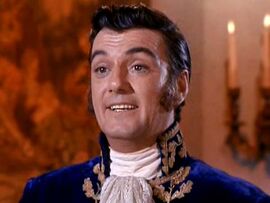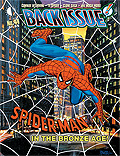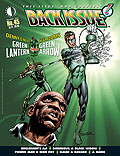Season 1
Episode 18: The Squire of Gothos
Filmed: October/November 1966
First Air Date: January 12, 1967
Karen: While "The Squire of Gothos" is a very competent episode, it's not one that I find particularly interesting or entertaining. I'm not a fan of the 'omnipotent alien entity', especially the mischievous kind, which is a trope Star Trek would dip into more than a few times. Trelane in this episode is clearly the inspiration for the being Q who appeared frequently in Star Trek: The Next Generation. Besides Trelane, the Enterprise crew in the original series would encounter Apollo, Sargon and his fellow disembodied aliens, the Organians, the Metrons, and I'm sure other all-powerful types I am forgetting. Trelane is remarkable for appearing to be a cosmic dandy, but in reality was just a small boy, playing at war.
Karen: This episode was written by Paul Schneider, who had also delivered the screenplay for "Balance of Terror." Clearly this story was much more fantasy-oriented, and even he had some reservations about it. But the staff was generally pleased with his script, which obviously borrowed heavily from The Most Dangerous Game. Producer Gene Coon came in to do some script polishing, including beefing up Kirk's confrontation with Trelane at the end.
Karen: Long-time BABsters know that Doug and I are both huge Planet of the Apes fans, and fans of actor Roddy McDowall, who played the chimps Cornelius and Caesar in the films. Can you imagine McDowall as Trelane? Well, both director Don McDougall and casting director Joe D'Agosta had wanted to hire McDowall for the role of Trelane, which would have been fantastic! But Gene Coon thought William Campbell would be perfect for it. Coon had worked with Campbell before on The Wild, Wild West and brought him in to read for the part. Campbell was excited about it, finding the role well-written. He certainly threw himself into it whole-heartedly. Maybe a little too much, but I suppose he was playing an over-imaginative, excitable boy. It brings to mind the Warren Zevon song of the same name. But I digress. Campbell would also appear on Trek as the Klingon commander Koloth in the episode "The Trouble with Tribbles," a role he would reprise on Star Trek: Deep Space Nine.
Karen: For Trelane's home, an entirely new set had to be built. 'Trelane's Drawing Room' was a round set -an unusual concept for that time - which designer Matt Jefferies was rightly proud of. The set was also decorated with some recognizable trophies, including the Salt Vampire from the "Man Trap" episode.McCoy does a fun double take at this.
Karen: Stan Robertson, the NBC representative, complained that this was another episode with a court room sequence (like "Court Martial" and "The Menagerie") and we were again seeing Kirk in a 'hunt and chase' situation. But most of all Robertson was concerned that the audience would not believe or perhaps not understand the story's conclusion, with Trelane revealed as just a child -all-powerful, but a child nonetheless. Of course, he had no reason to be concerned; the audience got it just fine.
Karen: While "The Squire of Gothos" is a very competent episode, it's not one that I find particularly interesting or entertaining. I'm not a fan of the 'omnipotent alien entity', especially the mischievous kind, which is a trope Star Trek would dip into more than a few times. Trelane in this episode is clearly the inspiration for the being Q who appeared frequently in Star Trek: The Next Generation. Besides Trelane, the Enterprise crew in the original series would encounter Apollo, Sargon and his fellow disembodied aliens, the Organians, the Metrons, and I'm sure other all-powerful types I am forgetting. Trelane is remarkable for appearing to be a cosmic dandy, but in reality was just a small boy, playing at war.
Karen: This episode was written by Paul Schneider, who had also delivered the screenplay for "Balance of Terror." Clearly this story was much more fantasy-oriented, and even he had some reservations about it. But the staff was generally pleased with his script, which obviously borrowed heavily from The Most Dangerous Game. Producer Gene Coon came in to do some script polishing, including beefing up Kirk's confrontation with Trelane at the end.
Karen: Long-time BABsters know that Doug and I are both huge Planet of the Apes fans, and fans of actor Roddy McDowall, who played the chimps Cornelius and Caesar in the films. Can you imagine McDowall as Trelane? Well, both director Don McDougall and casting director Joe D'Agosta had wanted to hire McDowall for the role of Trelane, which would have been fantastic! But Gene Coon thought William Campbell would be perfect for it. Coon had worked with Campbell before on The Wild, Wild West and brought him in to read for the part. Campbell was excited about it, finding the role well-written. He certainly threw himself into it whole-heartedly. Maybe a little too much, but I suppose he was playing an over-imaginative, excitable boy. It brings to mind the Warren Zevon song of the same name. But I digress. Campbell would also appear on Trek as the Klingon commander Koloth in the episode "The Trouble with Tribbles," a role he would reprise on Star Trek: Deep Space Nine.
Karen: For Trelane's home, an entirely new set had to be built. 'Trelane's Drawing Room' was a round set -an unusual concept for that time - which designer Matt Jefferies was rightly proud of. The set was also decorated with some recognizable trophies, including the Salt Vampire from the "Man Trap" episode.McCoy does a fun double take at this.
Karen: The interactions between Trelane and Kirk are well done, but for my money, Spock gets the best line in this episode, when he states his objections to Trelane, as seen in the clip below:
Karen: Stan Robertson, the NBC representative, complained that this was another episode with a court room sequence (like "Court Martial" and "The Menagerie") and we were again seeing Kirk in a 'hunt and chase' situation. But most of all Robertson was concerned that the audience would not believe or perhaps not understand the story's conclusion, with Trelane revealed as just a child -all-powerful, but a child nonetheless. Of course, he had no reason to be concerned; the audience got it just fine.



.jpg/revision/latest/scale-to-width-down/270?cb=20090318034237&path-prefix=en)


















































